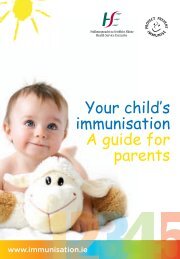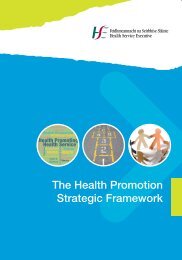Looking after your mental health for LGBT
Looking after your mental health for LGBT
Looking after your mental health for LGBT
Create successful ePaper yourself
Turn your PDF publications into a flip-book with our unique Google optimized e-Paper software.
What’s inside?<br />
‘Mental <strong>health</strong>’ – what does that mean?<br />
Supporting <strong>LGBT</strong> people’s <strong>mental</strong> <strong>health</strong><br />
10 ways to look <strong>after</strong> <strong>your</strong> <strong>mental</strong> <strong>health</strong><br />
A friend in need<br />
What life can throw at us<br />
Feel like you can’t cope?<br />
Need help now?<br />
Common <strong>mental</strong> <strong>health</strong> problems<br />
Support services – there is help out there<br />
2<br />
2<br />
2<br />
5<br />
6<br />
9<br />
10<br />
11<br />
14<br />
1
‘Mental <strong>health</strong>’ – what does that mean?<br />
Good <strong>mental</strong> <strong>health</strong> means you can cope with the normal stresses of life, you<br />
realise <strong>your</strong> abilities, you can work productively and are able to make a<br />
contribution to <strong>your</strong> community. Your <strong>mental</strong> <strong>health</strong> is an important part of<br />
you; it’s an important part of everyone. It’s about how we see and feel about<br />
ourselves and those around us – our family, our friends, classmates and<br />
colleague – people we see every day. When our <strong>mental</strong> <strong>health</strong> is good we can<br />
enjoy day to day life and we can get the best out of things. Good <strong>mental</strong> <strong>health</strong><br />
also helps us deal with problems and tough times in our lives.<br />
Supporting <strong>LGBT</strong> people’s <strong>mental</strong> <strong>health</strong><br />
This booklet has been developed by GLEN and BeLonG To Youth Service and<br />
was funded and published by the HSE National Office <strong>for</strong> Suicide Prevention.<br />
Negative life experiences can be stressful and this stress can affect our <strong>mental</strong><br />
<strong>health</strong>. Homophobia and transphobia can lead to specific stresses <strong>for</strong> lesbian,<br />
gay, bisexual and transgender (<strong>LGBT</strong>) people that can also have a negative<br />
impact on their <strong>mental</strong> <strong>health</strong>. This booklet provides in<strong>for</strong>mation <strong>for</strong> <strong>LGBT</strong><br />
people on how they can look <strong>after</strong> their <strong>mental</strong> <strong>health</strong> and highlights the<br />
services available if <strong>LGBT</strong> people need support.<br />
<strong>Looking</strong> <strong>after</strong> <strong>your</strong>self<br />
We all need to look <strong>after</strong> our <strong>mental</strong> <strong>health</strong> and just like physical <strong>health</strong> it needs<br />
to be maintained. <strong>Looking</strong> <strong>after</strong> <strong>your</strong>self is the best way to maintain good<br />
<strong>mental</strong> <strong>health</strong>. Here are ten things you can do to look <strong>after</strong> <strong>your</strong> <strong>mental</strong> <strong>health</strong>:<br />
1. Accept <strong>your</strong>self<br />
We’re all different, but the one thing we have in common is that none of us<br />
are perfect. We all have a mix of strengths and weaknesses and that’s part<br />
of what makes us human. Be nice and take good care of <strong>your</strong>self. Going<br />
easy on <strong>your</strong>self will help you feel better and is good <strong>for</strong> <strong>your</strong> <strong>mental</strong><br />
<strong>health</strong>.<br />
2
Accepting <strong>your</strong>self as Lesbian, Gay, Bisexual or Transgender can sometimes<br />
be made more difficult because of a fear of how people will react to you,<br />
or because of experiences of homophobia or transphobia. Try not to be<br />
too hard on <strong>your</strong>self, and if you are finding things difficult, seek support<br />
from one of the organisations listed at the back of this booklet<br />
(see pages 14 and 16).<br />
2. Get involved<br />
Having things to do which occupy <strong>your</strong> mind or that get you involved with<br />
people is good <strong>for</strong> <strong>your</strong> <strong>mental</strong> <strong>health</strong>. Meeting people and getting<br />
involved in new things can make all the difference – <strong>for</strong> you and <strong>for</strong> others.<br />
Join a group or a club. Get involved in a community activity or<br />
organisation. Or meet up with friends. Being involved with others will help<br />
you feel better.<br />
3. Keep active<br />
Regular exercise can really give <strong>your</strong> <strong>mental</strong> <strong>health</strong> a boost. Find something<br />
active you enjoy – sport, swimming, walking, dancing or cycling – and<br />
decide when you are going to do it. It might be an ef<strong>for</strong>t but it will be<br />
worth it. The more fun it is, the better the effect on <strong>your</strong> <strong>mental</strong> <strong>health</strong>.<br />
4. Eat well<br />
Having a balanced diet will not only help the way you feel, but it will also<br />
help the way you think. Try to eat regularly and aim to eat five portions of<br />
fruit and vegetables every day. Good food is essential <strong>for</strong> <strong>your</strong> mind and<br />
body to work properly. However, it can be good to treat <strong>your</strong>self from<br />
time to time and have exactly what you want.<br />
5. Keep in contact<br />
Friends are important, so it’s good to keep up contact with them. This is<br />
especially true at those times when you don’t feel like being in touch with<br />
anyone. So send a text, make a call, log onto Bebo/Facebook, or even<br />
better arrange to meet up with a friend. Making new friends can be<br />
difficult but getting involved in social activities or a group is a great way<br />
of meeting new people.<br />
3
6. Relax<br />
Relaxation is good <strong>for</strong> <strong>your</strong> <strong>mental</strong> <strong>health</strong> so doing things that make you<br />
feel calm are helpful. Fit things into <strong>your</strong> day and week that help you<br />
unwind, like listening to music, reading or watching a film.<br />
7. Don’t binge drink<br />
Drinking alcohol to deal with problems will only make things worse. It is<br />
best to drink in a safe way, in moderation and avoid binge-drinking.<br />
Overdoing it can damage <strong>your</strong> <strong>health</strong> and won't help you deal with the<br />
cause of <strong>your</strong> worries. Alcohol is a depressant and overdoing it can<br />
increase anxiety and lead to depression.<br />
8. Talk about it<br />
You don’t have to appear to be strong and struggle on alone. When you’re<br />
upset or feeling low, talking about how you feel will help. Talk to someone<br />
you trust and if you feel there is nobody to talk to, call a helpline such as one<br />
of the <strong>LGBT</strong> helplines (see list on page 14 or visit www.lgbt.ie). People will<br />
listen and give you support if you let them know how you’re feeling.<br />
9. Ask <strong>for</strong> help<br />
When we’re feeling down or anxious it can be hard to open up and let<br />
people know. But asking <strong>for</strong> help in tough times is a sign of strength. You<br />
might worry about how people will react but when you let someone know<br />
you need their help, they usually respond positively. Take the step to let<br />
someone know you need help. As the saying goes, a problem shared is a<br />
problem halved.<br />
10. Do something you enjoy<br />
Whether it’s watching <strong>your</strong> favourite film, cooking a nice meal, sports or a<br />
hobby, we all have things we love to do. Doing something you enjoy if<br />
you’re not feeling great will help you feel better.<br />
4
A friend in need...<br />
Problems with friends or family, work or school as well as normal everyday<br />
stress can make you feel upset, irritable, over-sensitive, apathetic or<br />
withdrawn. These feelings are normal and usually pass, but if they don’t go<br />
away they can be a sign of a <strong>mental</strong> <strong>health</strong> problem.<br />
Other signs that might indicate a <strong>mental</strong> <strong>health</strong> problem are:<br />
● Withdrawal from friends, family, school, work, sports or other things<br />
that are usually enjoyable<br />
● A major change in mood or inappropriate responses to certain<br />
situations<br />
● Disturbed sleep – either not getting enough or sleeping too much<br />
● Disturbed eating patterns – either eating less than normal or overeating<br />
● Pre-occupation and obsession about a particular issue<br />
● Lack of care <strong>for</strong> personal appearance or personal responsibilities<br />
● A drop in per<strong>for</strong>mance or participation at work, at school or in hobbies<br />
● Doing things that don’t make sense to others or hearing or seeing<br />
things that nobody else can hear or see<br />
If you think that someone you know might be having problems, look out <strong>for</strong><br />
the signs listed above and talk to them about it. Most people will turn to a<br />
friend <strong>for</strong> support during tough times, so being there <strong>for</strong> <strong>your</strong> friends can<br />
really help.<br />
Remember, it is important to look <strong>after</strong> <strong>your</strong> own <strong>mental</strong> <strong>health</strong>, so don’t<br />
take on more than you feel com<strong>for</strong>table with. Talk to someone about <strong>your</strong><br />
concerns. You are not responsible <strong>for</strong> everyone else, but you can offer<br />
support. It can be a huge worry if someone tells you they have<br />
thoughts of self-harm or suicide. Sometimes they don’t want you to tell<br />
anyone else, but you must explain to them that you can’t keep this to<br />
<strong>your</strong>self and that you can help them get the support they need. If someone<br />
confides in you, it means they are reaching out <strong>for</strong> help. If they<br />
didn’t want help, they wouldn’t have told you.<br />
5
What life can throw at us...<br />
As we go through life, we all experience change and transition. Negative life<br />
experiences can be stressful and this stress can affect our <strong>mental</strong> <strong>health</strong>.<br />
Stresses such as relationship problems or losing a loved one can be<br />
experienced by anyone. Homophobia and transphobia can lead to specific<br />
stresses <strong>for</strong> <strong>LGBT</strong> people and this can also have a negative impact on <strong>your</strong><br />
<strong>mental</strong> <strong>health</strong>. Most people know they are <strong>LGBT</strong> <strong>for</strong> some time be<strong>for</strong>e they<br />
tell others. When someone is considering coming out, they may be afraid<br />
that family and friends will reject them if they know they are <strong>LGBT</strong>. This can<br />
be a lonely and worrying time and can put a strain on our <strong>mental</strong> <strong>health</strong>.<br />
Young <strong>LGBT</strong> people have to deal with the normal stresses of growing up as<br />
well as other stresses like isolation, name-calling and homophobic bullying.<br />
Bullying or harassment<br />
Many people will experience bullying. Anyone can be bullied but <strong>LGBT</strong><br />
people can also experience homophobic/transphobic bullying or<br />
harassment. It can happen anywhere, such as the classroom, the workplace,<br />
sporting field or the home. Being a victim of bullying may lead you to feel<br />
upset, threatened, humiliated or vulnerable.<br />
Bullying and harassment can cause physical, <strong>mental</strong> and social pain and can<br />
make you feel alone, scared, angry, confused or sad. All of these can affect<br />
<strong>your</strong> <strong>mental</strong> <strong>health</strong>. If you experience bullying or harassment, talk to<br />
someone about it, whether it’s a colleague, school counsellor, family<br />
member, friend or <strong>your</strong> doctor.<br />
Losing a loved one<br />
At some point in our lives we all experience the pain of losing someone we<br />
love through death. Bereavement can have a serious impact on <strong>your</strong> <strong>health</strong>.<br />
When someone dies, you enter the process of grieving. There is no right or<br />
wrong way to grieve and you can experience a wide range of emotions as<br />
you come to terms with someone’s death. Normal feelings include being<br />
6
stunned at the loss, sadness or depression, longing <strong>for</strong> the person who has<br />
died, anger towards <strong>your</strong>self or others, regret over a last encounter or regret<br />
that something was left unsaid. All of this can be part of the grieving process.<br />
Eventually, the shock of bereavement and the strength of <strong>your</strong> feelings<br />
should begin to fade, but it does take time to go through this process and it<br />
may affect <strong>your</strong> <strong>mental</strong> <strong>health</strong>. If this happens, it is important to get help<br />
through <strong>your</strong> doctor, a bereavement support group or <strong>your</strong> local <strong>mental</strong><br />
<strong>health</strong> service (www.hse.ie).<br />
When an <strong>LGBT</strong> person loses their partner they may not get the same reaction<br />
or support that a heterosexual person gets when they lose their spouse or<br />
partner. People may fail to appreciate what <strong>your</strong> partner meant to you and<br />
the love you had <strong>for</strong> each other. Experiences like this can make grieving all<br />
the more difficult <strong>for</strong> <strong>LGBT</strong> people. The booklet Coping with the death of<br />
<strong>your</strong> same-sex partner was developed by GLEN and the Irish Hospice<br />
Foundation and is available at www.glen.ie<br />
Relationship problems<br />
Sometimes relationships can be a source of pressure <strong>for</strong> people, pressure to<br />
be someone you’re not or to do things you’re unsure about. This can put a<br />
strain on <strong>your</strong> <strong>mental</strong> <strong>health</strong>. Developing a new relationship can also make it<br />
difficult <strong>for</strong> you to find enough time <strong>for</strong> <strong>your</strong> friends and family. When you<br />
begin a relationship with a new partner, it is important to keep working on<br />
<strong>your</strong> existing friendships and family relationships as well as <strong>your</strong> new<br />
relationship.<br />
Relationship break-up can also have a powerful impact on <strong>your</strong> <strong>mental</strong><br />
<strong>health</strong>, bringing a range of emotions, such as uncertainty <strong>for</strong> the future,<br />
anger, sadness, loneliness and isolation, and often a sense of failure.<br />
Relationship break-up can be more difficult if you are a parent as you also<br />
have to deal with the impact on <strong>your</strong> children. It can be difficult to adjust to<br />
new circumstances and this can affect <strong>your</strong> <strong>mental</strong> <strong>health</strong>. It is important to<br />
get support to help you through this difficult time (see page 14 to 16).<br />
7
Coming out<br />
For many <strong>LGBT</strong> people, coming out can be a challenging time. It is common<br />
<strong>for</strong> <strong>LGBT</strong> people to be afraid that family and friends might reject them when<br />
they find out they are <strong>LGBT</strong>. This can put a strain on <strong>your</strong> <strong>mental</strong> <strong>health</strong>. But<br />
coming out can also be an exhilarating and rewarding experience which in<br />
itself can improve <strong>your</strong> <strong>mental</strong> <strong>health</strong>. Most people have a positive<br />
experience when they come out to family and friends. It is a good idea to<br />
prepare be<strong>for</strong>e coming out to a family member, friend or colleague. You may<br />
want to consider some of the following:<br />
●<br />
●<br />
●<br />
Think about who you want to come out to. Why are you coming out to<br />
this particular person?<br />
Think about the location and timing of where and when you are going<br />
to come out. Will you have a private space to talk uninterrupted? If you<br />
are fearful of a negative reaction, choose a location where you feel safe<br />
Time to digest – people will react in different ways to you coming out.<br />
Give them some time to take in the news<br />
Lack of support from family or friends<br />
Some <strong>LGBT</strong> people can experience a lack of support from family and friends.<br />
This may happen when someone first comes out, when they get into a<br />
relationship, start a family or when a relationship ends. This can manifest in<br />
any number of ways and can be hurtful, and even detri<strong>mental</strong> to <strong>your</strong> <strong>mental</strong><br />
<strong>health</strong>. Sometimes families, in particular parents, may not know how to<br />
adequately support <strong>LGBT</strong> family members and may need some support<br />
themselves. In<strong>for</strong>mation and support is available <strong>for</strong> <strong>LGBT</strong> people and their<br />
parents from a wide variety of organisations (see list of support services on<br />
pages 14 and 16).<br />
8
Feel like you can’t cope?<br />
Problems with alcohol or drugs<br />
Alcohol and drug misuse can damage <strong>your</strong> <strong>mental</strong> <strong>health</strong>. Signs that alcohol<br />
or drugs are becoming a serious problem include:<br />
● Becoming dependent on alcohol or drugs – dependence means you<br />
need alcohol or drugs to get through the day or to deal with everyday<br />
situations<br />
● Letting alcohol or drugs begin to affect <strong>your</strong> relationships, school/work<br />
or family life – friends and family expressing concern about <strong>your</strong><br />
drinking or school/work per<strong>for</strong>mance being affected by alcohol or<br />
drug-taking<br />
If you are concerned about <strong>your</strong> alcohol or drug use or someone else’s, talk<br />
to a family member or someone you trust. Support is available if you want<br />
to talk to someone in confidence about <strong>your</strong> concerns. BeLonG To runs a<br />
dedicated Drugs Education and Support Service <strong>for</strong> <strong>LGBT</strong> young people<br />
aged 14-23. For further in<strong>for</strong>mation or to talk to a Drugs Education &<br />
Outreach Worker please visit www.belongto.org (see also list of support<br />
services on pages 14 and 16).<br />
Self-harm and feeling suicidal<br />
Self-harm means inflicting injury or harm on <strong>your</strong>self as a way of dealing<br />
with emotional distress. Sometimes distressing problems can appear<br />
permanent and it can seem that things will never get better. This can be a<br />
scary and lonely place to be. Some people use self-harm as a way to try to<br />
escape from or deal with pain or stress that they cannot tolerate in their lives.<br />
For <strong>LGBT</strong> people this may or may not be related to being <strong>LGBT</strong>. Sometimes<br />
<strong>LGBT</strong> people may self-harm because of the emotional distress caused by<br />
experiences such as fear of rejection or homophobic bullying.<br />
9
If you have self-harmed or are thinking about it, there are people who can<br />
help you work through <strong>your</strong> problems who will not judge you. Talk to<br />
someone about how you feel. If you would prefer to talk to someone without<br />
giving <strong>your</strong> name, there are helplines and organisations that can help (see<br />
list of support services on pages 14 and 16).<br />
Having thoughts of suicide is not uncommon. But it is very important to know<br />
that if you are having these thoughts, you need help and support to deal with<br />
whatever is causing you to feel this way. Every problem has a solution, but<br />
sometimes because you are feeling so low you can’t see it. You are not alone<br />
and there are people who can help you find a solution and work through <strong>your</strong><br />
problems, no matter how difficult they appear to you. Talk to someone you<br />
can trust and tell them how you are feeling. If there is nobody you can talk to<br />
call the Samaritans on 1850 60 90 90 (who are available 24 hours a day every<br />
day of the year to provide emotional support to anyone who calls) or call<br />
another helpline (see page 14 to 16).<br />
Need help now?<br />
If you, or someone you know, is in urgent need or in crisis now and need<br />
someone to talk to:<br />
●<br />
●<br />
Contact <strong>your</strong> local doctor, listed under ‘General Practitioners’ in the<br />
Golden Pages or visit www.icgp.ie<br />
Go to, or contact, the Accident and Emergency Department of <strong>your</strong><br />
nearest general hospital<br />
● Contact the emergency services by calling 999 or 112<br />
●<br />
Contact Samaritans on 1850 60 90 90 (Republic of Ireland) or<br />
08457 909 090 (Northern Ireland)<br />
10
Common <strong>mental</strong> <strong>health</strong> problems<br />
While some <strong>mental</strong> <strong>health</strong> problems are fairly common they are sometimes<br />
misunderstood. This is a brief outline of some of these problems. If you are<br />
concerned that you, or someone you know, might be showing signs of a<br />
<strong>mental</strong> <strong>health</strong> problem, it is important to get support. Support can range<br />
from in<strong>for</strong>mal help from friends or family, advice from <strong>your</strong> doctor,<br />
counselling or medication. A list of supports, including <strong>LGBT</strong> services, is<br />
included at the back of this booklet (pages 14 and 16).<br />
Anxiety<br />
Anxiety is a common experience <strong>for</strong> both men and women. Depending on<br />
the type and severity of anxiety, it can have a damaging impact on <strong>your</strong><br />
quality of life. For some, anxiety can be a passing emotion attached to<br />
stressful situations such as exams, getting married or work pressures. For<br />
others, it is more than this. The signs associated with anxiety can include a<br />
racing heart, rapid breathing, feelings of panic, sweating, excessive and<br />
undue worrying, disturbed sleep, tense muscles, morbid thoughts and fear<br />
of going mad.<br />
Although in some instances <strong>your</strong> anxiety may have no apparent cause,<br />
people who are considered most ‘at risk’ of developing an anxiety disorder<br />
include those who have undergone a major life event such as bereavement,<br />
a relationship break-up or unemployment; those who misuse drugs and<br />
alcohol; or those with a family history of anxiety. For <strong>LGBT</strong> people, anxiety<br />
can be strongly linked to the fear of rejection by family and friends be<strong>for</strong>e<br />
coming out. Lack of support, isolation or harassment/bullying can also lead<br />
to anxiety <strong>for</strong> <strong>LGBT</strong> people.<br />
11
Depression<br />
We all feel fed up, miserable or sad from time to time. These feelings don't<br />
usually last longer than a few days or a week, and they don't interfere too<br />
much with our lives. Sometimes there's a reason, but sometimes these<br />
feelings just come out of the blue. We usually cope with them ourselves.<br />
We may have a chat with a friend but don't otherwise need any help.<br />
Symptoms of depression include:<br />
●<br />
●<br />
●<br />
●<br />
feelings of sadness or hopelessness<br />
difficulty with daily activities<br />
difficulty concentrating<br />
changes in sleeping or eating patterns<br />
You may be depressed, or experiencing depression, when:<br />
●<br />
●<br />
the symptoms of depression last <strong>for</strong> two weeks or more, and<br />
the symptoms interfere with <strong>your</strong> everyday life<br />
Depression can occur from a young age or can come late in life. It can also<br />
be associated with physical <strong>health</strong> problems or negative experiences such<br />
as homophobic bullying or isolation. The symptoms of depression,<br />
regardless of <strong>your</strong> life stage or circumstances, should be taken seriously and<br />
never dismissed.<br />
The feeling of depression is much more powerful and unpleasant than the<br />
short episodes of unhappiness that we all experience from time to time.<br />
Due to the length of time it lasts and its impact on <strong>your</strong> life and<br />
relationships, you need to get help <strong>for</strong> depression as soon as possible<br />
(see pages 14 and 16).<br />
Bipolar disorder<br />
Bipolar disorder used to be called ‘manic depression’. As the name suggests,<br />
it is characterised by mood swings that are beyond what most people<br />
experience in their lives, although they can also be subtle and gradual. With<br />
12
ipolar disorder, moods can swing between low, high and mixed. A low<br />
mood involves feelings of intense depression and despair. This is known as<br />
a depression and symptoms include those listed above. A high mood<br />
involves feelings of elation. This is also known as mania or a manic period.<br />
Symptoms include impaired judgement, over-spending, too much energy<br />
and little need <strong>for</strong> sleep, anger or irritability and unrealistic beliefs in one’s<br />
own abilities.<br />
A mixed mood involves, <strong>for</strong> example, depressed mood with the restlessness<br />
and over activity of a manic episode. People usually experience both<br />
depressive and manic episodes, but some will have only manic episodes.<br />
Bipolar disorder affects about one in every 100 adults. It can start at any time<br />
during or <strong>after</strong> the teenage years, although it is unusual <strong>for</strong> it to start <strong>after</strong><br />
the age of 40. Men and women are affected equally.<br />
Schizophrenia<br />
Schizophrenia is a serious <strong>mental</strong> illness marked by disturbances in <strong>your</strong><br />
thoughts, perceptions, emotions and behaviour. It affects about one in every<br />
100 people worldwide. It is rare be<strong>for</strong>e the age of 15, but it can start any time<br />
<strong>after</strong> this, most often between the ages of 15 and 35.<br />
The symptoms of schizophrenia are broken into two groups: ‘positive’ and<br />
‘negative’ symptoms. Positive symptoms include the more recognisable<br />
things like hallucinations, hearing voices, delusions, muddled thinking and<br />
feeling that you are being controlled. ‘Negative’ symptoms are less easy to<br />
spot and include a loss of energy, enthusiasm and motivation, difficulty<br />
concentrating and uneasiness in other people’s company.<br />
People with schizophrenia can and do recover. For more in<strong>for</strong>mation,<br />
contact Shine on 1890 621 631 or log onto www.shineonline.ie<br />
13
Support services – there is help out there<br />
The services listed below have a lot of experience in helping people to<br />
overcome their problems. If you would like to talk to someone in confidence,<br />
they can help.<br />
Please note: this is not a complete list of support services. Your local HSE<br />
Health Office will be able to provide a more detailed guide to support<br />
services available in <strong>your</strong> area. Call 1850 24 1850 or log onto www.hse.ie <strong>for</strong><br />
contact details.<br />
Mental Health Support Services<br />
Samaritans 1850 60 90 90, www.samaritans.org, jo@samaritans.org<br />
Childline 1800 66 66 66, www.childline.ie<br />
Teenline 1800 833 634, www.teenline.ie<br />
Aware (Depression) 1890 303 302, www.aware.ie, wecanhelp@aware.ie<br />
Pieta House (Self-Harm/Suicide Support) 01-6010000,<br />
www.pieta.ie, mary@pieta.ie<br />
Bodywhys (Eating Disorders) 1890 200 444,<br />
www.bodywhys.ie, alex@bodywhys.ie<br />
Console (Suicide Bereavement Support) 1800 201 890, www.console.ie<br />
Grow (Mental Health Support Groups) 1890 474 474, www.grow.ie<br />
Alcoholics Anonymous www.alcoholicsanonymous.ie<br />
Mental Health Ireland www.<strong>mental</strong><strong>health</strong>ireland.ie<br />
Support <strong>for</strong> Young <strong>LGBT</strong> People<br />
BeLonG To Youth Services 01-6706223 info@belongto.org<br />
For a full list of <strong>LGBT</strong> youth supports around the country please see<br />
www.belongto.org<br />
14
<strong>LGBT</strong> Helplines<br />
Cork Lesbian Line: 021-4318318<br />
Dublin Lesbian Line: 01-8729911<br />
Dundalk Outcomers Helpline: 042-9353035<br />
Gay In<strong>for</strong>mation Cork: 021-4271087<br />
Gay Switchboard Dublin: 01-8721055<br />
Limerick Gay & Lesbian Helpline: 061-310101<br />
Outwest Helpline: 094-9372479<br />
TENI Helpline: (Transgender Support) 085-1477166<br />
Numbers <strong>for</strong> all <strong>LGBT</strong> helplines can be found at www.lgbt.ie<br />
<strong>LGBT</strong> Centres and Groups<br />
Dundalk Outcomers 042-9329816 www.outcomers.org<br />
Gay Men’s Health Service 01-8734952 gmhpoutreach@eircom.net<br />
L.inC (Lesbians in Cork) 021-4808600 www.linc.ie<br />
The Other Place (Cork) 021-4278470 www.theotherplacecork.com<br />
Outhouse Community Centre Dublin 01-8734932 www.outhouse.ie<br />
Outwest Ireland 087-9725586 www.outwestireland.ie<br />
Rainbow Support Service Midwest 061-310101<br />
www.rainbowsupportservices.org<br />
South Water<strong>for</strong>d 086-2147633 www.southgroup.wetpaint.com<br />
Transgender Equality Network Ireland (TENI) 085 147 7166 www.teni.ie<br />
Support <strong>for</strong> Parents<br />
LOOK (Parent Support)<br />
Parent Support in Cork<br />
087-2537699 www.lovingouroutkids.org<br />
021- 4304884 info@gayprojectcork.com<br />
15
Internet support<br />
A number of support services are now using the internet to reach out to<br />
people. Some examples are:<br />
www.<strong>your</strong><strong>mental</strong><strong>health</strong>.ie<br />
www.letsomeoneknow.ie<br />
www.spunout.ie<br />
www.reachout.com<br />
www.belongto.org<br />
www.heads-away-just-say.com/<br />
These services offer <strong>mental</strong> <strong>health</strong> in<strong>for</strong>mation and signposting to other<br />
services.<br />
Social, sports and cultural activities<br />
Check Gay Community News, the monthly <strong>LGBT</strong> magazine, at www.gcn.ie<br />
<strong>for</strong> a detailed list of <strong>LGBT</strong> social, cultural and sporting groups and<br />
organisations and online <strong>for</strong>ums.<br />
16
















